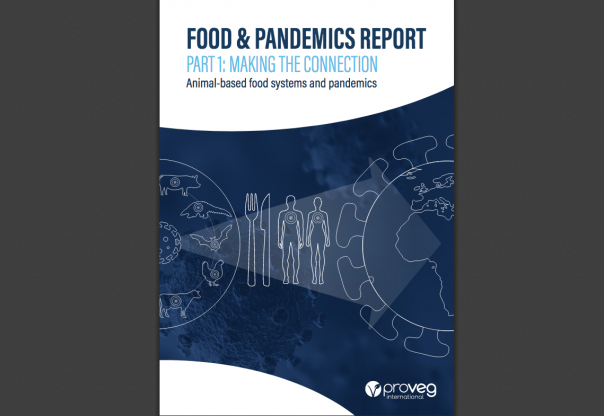
The Food & Pandemics Report, produced by ProVeg International, identifies the eating and farming of animals as the single most risky human behaviour in relation to pandemics, and calls for urgent changes to the global food system in order to prevent future outbreaks.
Dr Musonda Mumba of the UN Environment Programme (UNEP) said: “The ProVeg report clearly demonstrates the connection between industrial animal production and the increased risk of pandemics. Never before have so many opportunities existed for pathogens to jump from wild and domestic animals to people.”
The report finds that our dietary choices and the global food system are the key drivers of zoonoses (diseases such as Covid-19, which are transmitted from non-human animals to humans) in three clear and mutually reinforcing ways:
1) Through the destruction of animals’ natural habitats and loss of biodiversity, driven largely by animal agriculture.
2) Through the use of wild animals as food.
3) Through the use of farmed animals as food in intensified animal agriculture.
About 75% of all emerging infectious diseases are zoonotic, including SARS, MERS, Ebola, rabies, and certain forms of influenza, which between them are responsible for an estimated 2.5bn cases of illness and 2.7m deaths worldwide, every year.
The report says that although the origins of such outbreaks tend to be associated with wild animals, as is assumed with Covid-19, pathogens also jump from wild animals to farmed animals before being transmitted to humans – as was the case with recent pandemic threats such as avian flu and swine flu.
Jens Tuider, international director of ProVeg International, and lead author of the report, said: “The recipe for disaster is surprisingly simple: one animal, one mutation, one human, and a single point of contact.
“We don’t yet know the full story about the emergence of Covid-19, but there is no uncertainty regarding swine flu and avian flu: those viruses evolved on factory farms, where conditions are perfect for the evolution and transmission of viruses, as well as for the development of antimicrobial resistance.
“Factory farms are perfect breeding grounds for future pandemics.
“There are so many reasons to move away from intensively farming animals – to tackle the climate crisis, to protect the environment, to combat antibiotic resistance, to protect our health, and for the welfare of animals.
“But mitigating the risk of the next pandemic, which could have an even more devastating impact than Covid-19, is perhaps the most persuasive reason of all.
“Science clearly supports this, but is there enough political will?”
The report also shines a light on climate change, which increases the risk of future pandemics, and antimicrobial resistance, which exacerbates their impact. It says both are driven by our animal-based food system, the demand for which continues to grow rapidly. The report also touches on Covid-19’s impact on slaughterhouse workers.
Dr Mumba added: “We have also seen in the last few months how industrial animal-production spaces have been spaces for the spread of COVID-19. Clearly this provides another opportunity for a rethink of our food systems as they relate to pandemics.”